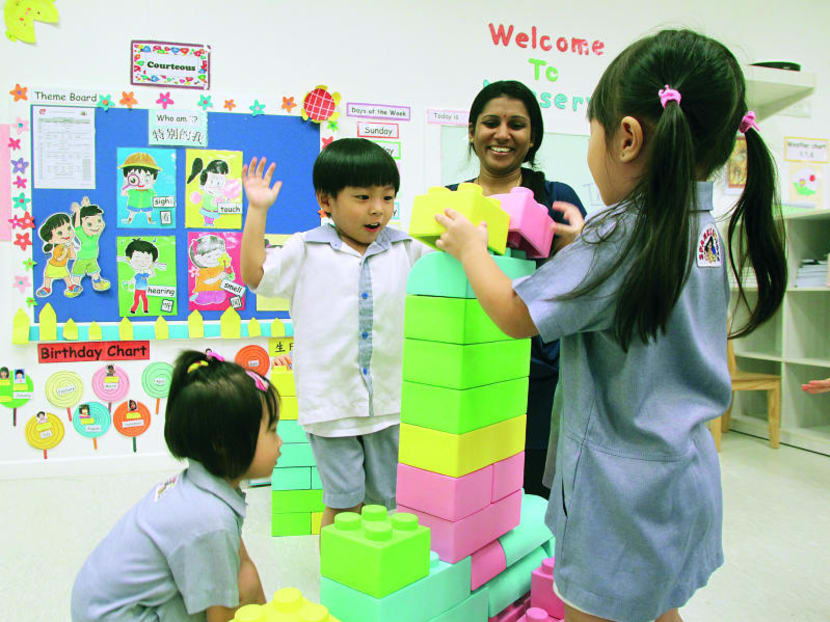Start teaching maths and science early
Recently, Mr Heng Swee Keat, the Education Minister, highlighted the importance of transforming Singapore’s education system to keep up with changes in the economy. In particular, Mr Heng stressed the need to help students build skills in problem-solving and applying knowledge.
Recently, Mr Heng Swee Keat, the Education Minister, highlighted the importance of transforming Singapore’s education system to keep up with changes in the economy. In particular, Mr Heng stressed the need to help students build skills in problem-solving and applying knowledge.
Among other ideas, he said schools must provide our children a strong foundation in literacy and numeracy, and give them a good grounding in STEM (science, technology, engineering and mathematics). How do we do that? One of the ways to promote an affinity for STEM is to start early by incorporating maths and science into the early childhood curriculum.
NEED FOR INTELLECTUAL LEARNING
The National Science Board (NSB) in the United States said exposing young children to scientific concepts makes them more comfortable with those ideas when they are older.
Additionally, early knowledge of maths is a good predictor not only of aptitude in the subject later in life, but also of reading ability. The NSB has encouraged the introduction of STEM into pre-school education, an idea that has been supported by many business groups that also worry about the workforce of tomorrow.
Such a suggestion is likely to make some parents recoil in horror, fearing that this will further chip away at the carefree aspect of childhood, pressuring children with more academic work at ever younger ages. Actually, though, that idea of rote learning, which many of us associate with our own experience of learning maths and science, could not be further from the notion of how children best learn science and maths.
Professor Lilian Katz, an eminent scholar of the early years, has distinguished between academic learning and intellectual learning. Academic learning consists of things such as memorising, reciting or counting, while intellectual learning means reasoning, hypothesising, predicting and analysing.
A pre-school STEM curriculum, Prof Katz argues, must emphasise the development of a child’s intellectual life; the curiosity, exploration and creativity that define the STEM disciplines at heart are what come naturally to children. Constructing a curriculum around that means lessons that are inquiry-based and child-centric in the sense that what captures the children’s imagination is what drives classroom activity, guided by a skilled teacher.
FOCUS ON TEACHERS
The importance of teaching skill cannot be overemphasised. As Professor Karen Worth, my colleague and a science educator, has noted, children are not exactly natural scientists all by themselves. Despite their proclivities for exploring the world, children need guidance, structure and appropriate activities to turn their natural inclinations into what we might think of as doing science. It is expert teachers who provide that direction.
It turns out that one of the biggest stumbling blocks to implementing STEM in early childhood classrooms is teacher reticence. Studies in other countries have shown that pre-school teachers generally lack awareness or understanding of engineering and technology. With that comes an inability and fear to try to implement those principles in their own classrooms.
We can focus some of our teacher training efforts at pre-service and in-service levels to ensuring that teachers have a basic understanding of scientific concepts, scientific thinking and method, and the nature of scientific inquiry. We should also encourage them to implement STEM-based project learning in the early childhood classroom.
Projects in the classroom embody how science works: There is a question that someone or a team is interested in, they come up with possible explanations or solutions, they devise ways to test them, they gather information and try to answer the question with it.
In the case of pre-school, teachers can take their cue from the questions that children have and guide their learning in ways that develop what we would think of as scientific thinking. We may not usually think of four-year-olds as having pressing questions about science or engineering, but when we are trained to listen purposefully to them, we will often hear them.
To illustrate this, consider the following: Recently, a group of pre-schoolers in a Singaporean childcare centre became fixated on The Three Little Pigs, the classic children’s story that they read and acted out in different ways. But beyond that, they wanted to know how to build a house to withstand the puffing of a wolf and insisted on constructing their own brick house. Their enterprising teacher did not dismiss their pleas as nonsense, but, over time, scavenged enough discarded bricks to make the playhouse project feasible.
With the children taking the lead on design, their skilled teacher guided them through concepts such as measurement, stability and balance, and let them explore the physical properties and limitations of different materials.This example shows both how STEM can be introduced into classrooms even at the youngest ages, when teachers are well-trained, and that it can enhance, not detract from or eclipse, the joy and excitement of children’s play.
A quarter-century ago, Mr Robert Fulgham published a best-selling book entitled All I Really Need To Know I Learned In Kindergarten. With the right kind of pre-school science education, Singapore’s scientists and engineers of the future may say the same thing.
ABOUT THE AUTHOR:
Dr Trisha Craig is a social scientist and the executive director of Wheelock College – Singapore.







